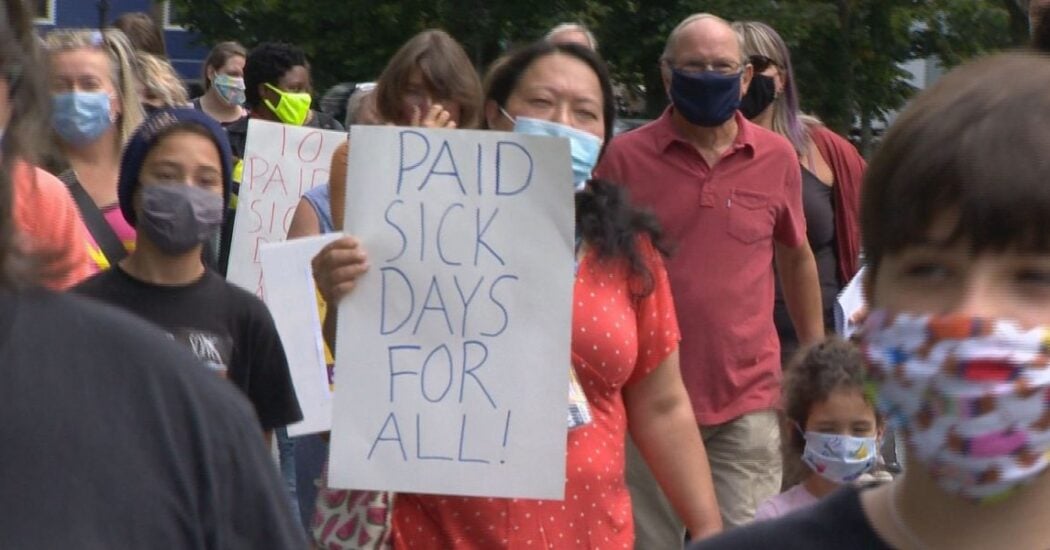
This article was first published in the excellent RandkandFile.ca. Republished with the kind permission of RankandFile and the author
KJIPUKTUK (Halifax) – Workplace infections have been the primary cause of COVID-19 outbreaks in hard-hit areas across Canada, yet 54 percent of Nova Scotian workers lack guaranteed access to paid sick leave; a benefit proven to help prevent the spread of illnesses and keep the public safe.
In September 2020, the federal government implemented the Canada Recovery Sickness Benefit (CRSB) to assist workers and self-employed individuals rendered unable to work due to the pandemic, or who are at high risk of contracting COVID-19. However, strict eligibility criteria and a rigorous application process has left many without adequate coverage.
To address gaps in the federal CRSB program, and in response to public outcry, Nova Scotia introduced its own temporary pandemic program which offered four paid sick days to those who qualified. While a step in the right direction, this measure only took effect over a year into the pandemic, and only spanned from May 10th to July 31st despite COVID-19’s threatening presence both before and after this brief period.
A short-lived and very flawed program
Beyond the program’s short duration, several problems existed with its design and administration.
First of all, those with the ability to work-from-home did not meet the criteria.
“Excluding individuals working from home from government sponsored COVID-related sick pay suggests the intent of the program was to minimize community spread of COVID rather than to help to support the financial health of the individual,” says Rebecca Casey, Assistant Professor at Acadia University’s Department of Sociology and Research Associate with the Canadian Centre for Policy Alternatives.
“While individuals working from home are less likely to spread COVID to the community, the loss of income can still have a negative impact on their financial, emotional, and physical health.”
Further, a worker’s access to the program depended on their employer applying both on time and correctly. Eligible employees had to therefore trust their employers to follow through properly or risk going without the sick leave they were entitled to.
There were also rigid deadlines to access the benefit, and as a result, workers could experience a lag in pay. “We know 69% of workers in the province making less than $25,000 per year lack paid sick days,” says Casey. “A lag in pay, when earnings are already so low, could cause enormous distress.”
Additionally, workers who already had paid sick days were not eligible for program, even if they had already used theirs up.
Make the bosses pay
According to Global News, the Halifax Chamber of Commerce acknowledges the enormous value of paid sick days but suggests that their provision be a responsibility of federal government rather than of employers themselves.
Jason Edwards, lawyer and member of the Halifax Workers’ Action Centre, believes that such a system would encourage bad boss behaviour. “By turning the responsibility onto the government, and essentially the taxpayer, employers could actually be rewarded for failing to protect their workers,” says Edwards. “Sick days should be covered by the boss, just like vacation and public holidays are.”
Guaranteeing paid sick days through the provincial Labour Standards Code would mean that employers could be held accountable in instances of non-compliance. Such a system would come with advantages for bosses, too.
“It is no secret that paid sick days come with enormous benefits to employers,” says Edwards. “Why should the government assume this cost for them?”
Nova Scotia needs paid sick days
Currently, Nova Scotia’s employment legislation only guarantees employees in the province 3 unpaid sick days per year, which is among the lowest in the country. The recent expiration of the provincial COVID-19 sick leave benefit means that almost half of the province’s workforce has now returned to life without paid sick day access.
In light of the inadequacies of both federal and provincial initiatives, a recent report by the Canadian Centre for Policy Alternatives recommends a sick leave policy that is universal, permanent and employer-paid. From a logistical standpoint, employer paid sick days help reduce delays in pay; something the report argues is especially important for low-wage and marginalized workers.
“People get sick, this is not new,” says Casey. “Workers should not have to choose between going to work sick and having enough money for food, housing and other essentials. We need sick days that are paid, permanent, and universal now and continuing beyond the pandemic.”
The loud cry for paid sick day access in Nova Scotia continues.
Join the Nova Scotia chapter of the CCPA on Wednesday September 1st, 12:30-1:30 pm for the launch of the new report No Nova Scotian Should Have To Work Sick.
Check out our new community calendar!
With a special thanks to our generous donors who make publication of the Nova Scotia Advocate possible.
Subscribe to the Nova Scotia Advocate weekly digest and never miss an article again. It’s free!



